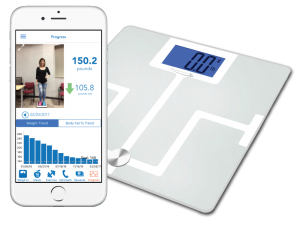Many of us have a love-hate relationship with the scale. Whether you’re looking to lose weight or maintain a weight loss, frequent check-ins with the scale are important.
6 reasons why weighing yourself is important
- It Sets a Starting Point – We understand it can feel discouraging to weigh yourself when just starting out on your health improvement journey, but it’s an important first step. It creates a starting point from which you can measure your progress.
- Holds You Accountable – Checking in with the scale frequently holds you accountable to your goals. It may prompt you to make healthier eating decisions or convince you not to skip your workout.
- Creates Awareness – It helps create awareness of the impact that your eating habits and physical activity can have on your weight. We don’t want you to obsess about the scale, but instead be aware of the changes that are taking place.
- Reaffirms and Motivates – Have you been working hard to make better food choices and exercising regularly? The scale over time should reflect that your choices are having a positive impact and motivate you to continue on with your journey.
- Provides Regular Feedback – Numbers don’t lie. Weighing in will show that what you’re doing is working! Or it might help you recognize a plateau and prompt you to change things up. Also, if you’ve had a difficult few weeks, it may help you correct course.
- Helps Recognize Fluctuations – Even if you’re not hoping to lose weight, weighing yourself is important. For one, it can help you notice any natural (and completely normal) fluctuations in your weight. It can also help you recognize any unwanted weight gain before 5 pounds become 15.
How often should you weigh in?
For years experts have had differing opinions on how often you should weigh yourself. However, a recent study shows that weighing yourself daily can have a positive effect on your weight loss and weight maintenance.
There isn’t a one size fits all approach to weight tracking though. If daily weigh-ins become a negative experience and cause poor self-esteem issues, creates an obsession with the number on the scale or becomes demotivating – a weekly or less frequent check in might be better.
Our program requires a quarterly weigh-in to be eligible for cash rewards, however, we recommend a more frequent weigh-in schedule.
Tips for Weighing in
- Weigh-in at the same time each day – Your weight fluctuates throughout the day. Ideally, weigh in at the same time each day for consistent weight readings.
- Wear the same, or similar amounts of clothes – A sweater and jeans weighs more than shorts and a t-shirt. Try to wear the same, or very similar weight clothes, each time you weigh in. Remember, our Health Coaches do audit and view weigh-ins prior to generating cash rewards for weight loss, so keep that in mind when you choose what (or not to) wear when weighing in.
- Weigh in on the same scale – Every scale is calibrated differently. Your personal scale will give a different weight reading than the scale at a doctor’s office. To truly track your weight and progress, monitor your weight on one scale, like the incentaHEALTH Smart Scale.
Additional Ways to Monitor Your Progress
While the number on the scale is important, it’s not the only way your success can be measured. Do your clothes fit differently? Is your body fat composition changing? Did the measurements of your waist or hips change?

Another way is to look back through your Healthy Selfie weigh-in photographs and see how your body has physically been changing. The photos also serve as a reminder of how far you’ve come and the progress you are making. Use it as motivation to keep going (you’re seeing results) or to maintain your habits (see where you started).
As always, our Health Coaches are here to support you on this journey. If you have any questions tap chat with a coach in app or online, email us at [email protected] or call us at 800-694-0352.



